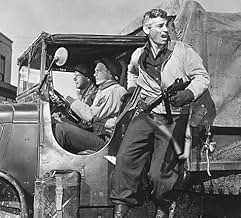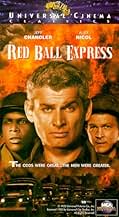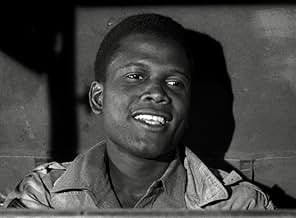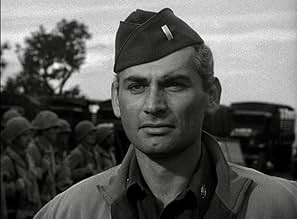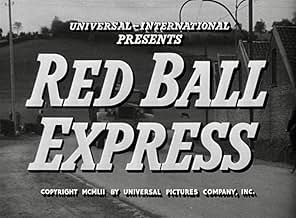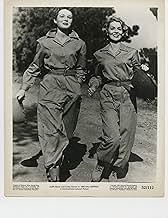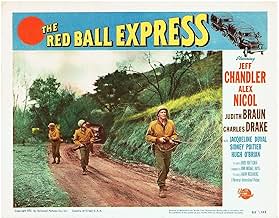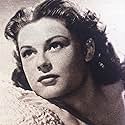Story of the military truck drivers who kept the Allied armies supplied in Europe during World War II.Story of the military truck drivers who kept the Allied armies supplied in Europe during World War II.Story of the military truck drivers who kept the Allied armies supplied in Europe during World War II.
- Director
- Writers
- Stars
Davis Roberts
- Pvt. Dave McCord
- (as Robert Davis)
Gregg Palmer
- Tank Lieutenant
- (as Palmer Lee)
Douglas Bank
- Mechanic
- (uncredited)
George Barrows
- Soldier in Bistro
- (uncredited)
Nan Boardman
- French Peasant Mother
- (uncredited)
- Director
- Writers
- All cast & crew
- Production, box office & more at IMDbPro
Featured reviews
There is more to war than just the glory boys; 95% of the GIs in WW 2 (and all other wars) are never in the limelight as heroes, but they did more than their fair share of sacrifice. My father was one of those guys. He landed at Normandy, was with the infantry marching to the Hurtgen Forest, and getting overrun in the Battle of the Bulge. He was there for it all. He might not have been a hero in those battles (he was always looking for dry socks), but he was a hero to me. He and thousands of others, such as the men in The Red Ball Express, doing thankless jobs and sacrificing a lot more than just a few days lost sleep. Try driving 30 hours without sleep sometime. An underrated film, very similar to The Sorcerer, and the French film, Wages of Fear, but a bit more traditional. Good viewing.
Midway through the war, the March of Time devoted time to a filmed panel discussion - quite a new idea, then - as to how the war was to be won. One comment was "This is a Quartermasters' war. Solve the issue of logistics and you've won the war".
That might have been the mission statement of this, very watchable, film
That might have been the mission statement of this, very watchable, film
This is obviously a war film that will never be dated. Even after 60 years, it is fresh and relevant, because it tells about life the way it was in World War II, as experienced by people of the era, in a way that is credible.
We get a good mix of the "workmanship" of war, combined with "down time" and "deadly time". Chandler plays the officer who realizes how dangerous it is to be "lax", as one might be when 98% of your duty is simply workmanship, like driving, loading, and unloading supply trucks. It is the "unforeseeen" incident that gets you. It is being unready. It is the fluke or freak occurrence that will be deadly.
We have a star studded cast here, fairly common for old war films, but impossible for the twenty-first century, simply because of the dilution of movie making. Not that "dilution" is bad, but it's simply the fact that if everyone and his cousin is making a movie, then there are millions of actors, and thus no way for more than a few dozen to ever gain the sort of fame that hundreds of actors used to have.
The integration was splendid in this film, and believable. The white and black troopers behaved and spoke in a way that made you think they were from the mid twentieth century.
This is hard to do today. It is done today, but it is hard to sell that concept today. However, one must remember one thing in making World War II movies. If one makes it for the lingo of the era, as this film does, then it always remains true and credible. If one makes it for the lingo of 1990 or 2000, it will get a huge following for that generation, but in 80 years, it will be scoffed at by later generations, while films like "Red Ball Express" continue to stick around.
The acting is great, and the characters are great. Each character brings his own story to the screen, so we have many subplots. There are 3 major ones, each involving the major stars.
The subplots are handled well, and while the one with Chandler and Nicol is over the top, it is dramatic and theatrical, and well handled.
Chandler was the big star at the time. O'Brien is a minor mainstay, somehow always remaining a recognizable individual that is rare for leading man types. Poitier is a legend, with "Lillies", "Heat", "Dinner", and "Bedford" insuring his status. Drake will always remain a mainstay as a player of lovable rogues. This may be his best role, as he pretty much steals the show. Alex Nicol is the wild card. Films like this, "Then There Were Three", and "The Man From Laramie" will go back and forth to and from classic status, and he will be a huge name in classic film a hundred years from now. He probably never realized this while he was making "B" budget movies.
We get a good mix of the "workmanship" of war, combined with "down time" and "deadly time". Chandler plays the officer who realizes how dangerous it is to be "lax", as one might be when 98% of your duty is simply workmanship, like driving, loading, and unloading supply trucks. It is the "unforeseeen" incident that gets you. It is being unready. It is the fluke or freak occurrence that will be deadly.
We have a star studded cast here, fairly common for old war films, but impossible for the twenty-first century, simply because of the dilution of movie making. Not that "dilution" is bad, but it's simply the fact that if everyone and his cousin is making a movie, then there are millions of actors, and thus no way for more than a few dozen to ever gain the sort of fame that hundreds of actors used to have.
The integration was splendid in this film, and believable. The white and black troopers behaved and spoke in a way that made you think they were from the mid twentieth century.
This is hard to do today. It is done today, but it is hard to sell that concept today. However, one must remember one thing in making World War II movies. If one makes it for the lingo of the era, as this film does, then it always remains true and credible. If one makes it for the lingo of 1990 or 2000, it will get a huge following for that generation, but in 80 years, it will be scoffed at by later generations, while films like "Red Ball Express" continue to stick around.
The acting is great, and the characters are great. Each character brings his own story to the screen, so we have many subplots. There are 3 major ones, each involving the major stars.
The subplots are handled well, and while the one with Chandler and Nicol is over the top, it is dramatic and theatrical, and well handled.
Chandler was the big star at the time. O'Brien is a minor mainstay, somehow always remaining a recognizable individual that is rare for leading man types. Poitier is a legend, with "Lillies", "Heat", "Dinner", and "Bedford" insuring his status. Drake will always remain a mainstay as a player of lovable rogues. This may be his best role, as he pretty much steals the show. Alex Nicol is the wild card. Films like this, "Then There Were Three", and "The Man From Laramie" will go back and forth to and from classic status, and he will be a huge name in classic film a hundred years from now. He probably never realized this while he was making "B" budget movies.
It's a sad commentary that before the Armed Services were integrated post World War II by President Truman, the Red Ball Express was one of the few that black American soldiers could fully participate in and that one was relatively behind the lines.
Jeff Chandler plays the steely eyed commander of this bunch of formerly civilian truck drivers now chosen as a unit to supply Patton's advancing army with needed fuel. Among the cast is a young Sidney Poitier as one of the drivers. They may have been behind the lines, but the picture clearly shows their participation in the war wasn't an easy street.
Chandler's job is to weld this disparate bunch into a unit and he succeeds despite a lot of racial tension. The cast performs admirably in this picture.
One of the great stories of World War II was the rapid advance across France of Patton's army after the breakout from the Normandy beachhead. He could have never done it without the heroic efforts of the men depicted in this movie. It was Ike's and Patton's secret weapon and this picture an admirable tribute to them.
Jeff Chandler plays the steely eyed commander of this bunch of formerly civilian truck drivers now chosen as a unit to supply Patton's advancing army with needed fuel. Among the cast is a young Sidney Poitier as one of the drivers. They may have been behind the lines, but the picture clearly shows their participation in the war wasn't an easy street.
Chandler's job is to weld this disparate bunch into a unit and he succeeds despite a lot of racial tension. The cast performs admirably in this picture.
One of the great stories of World War II was the rapid advance across France of Patton's army after the breakout from the Normandy beachhead. He could have never done it without the heroic efforts of the men depicted in this movie. It was Ike's and Patton's secret weapon and this picture an admirable tribute to them.
RED BALL EXPRESS is alright I suppose . It's no masterpiece just a B war movie produced to be shown before a main feature . It involves a bunch of civilian truck drivers drafted into Uncle Sam's army in 1944 and it's those men who keep the allied front lines supplied . It's a rather predictable story of Americans fighting against Germans and where you think the most likable guy in the squad has bought the farm only for them to appear minutes later alive and well . Like I said very predictable
I guess somewhere the producers wanted to point out ( Though this would probably be known to an American audience in 1952 ) why every American war film made at the time always revolved around white American soldiers fighting . This was because the American army was segregated until 1947 and with very few exceptions black Americans didn't serve in the front lines . Despite the producers wanting to speak up fr the Black American war effort it looks painfully dated now since the blacks have lovely singing voices and sing in unison about beating Hitler which comes across as being very stereotypical and highly patronising and I doubt if a studio would be able to get away with this nowadays . Thankfully it serves to remind a wider audience in the 21st Century why war movie GIs are almost always white
I guess somewhere the producers wanted to point out ( Though this would probably be known to an American audience in 1952 ) why every American war film made at the time always revolved around white American soldiers fighting . This was because the American army was segregated until 1947 and with very few exceptions black Americans didn't serve in the front lines . Despite the producers wanting to speak up fr the Black American war effort it looks painfully dated now since the blacks have lovely singing voices and sing in unison about beating Hitler which comes across as being very stereotypical and highly patronising and I doubt if a studio would be able to get away with this nowadays . Thankfully it serves to remind a wider audience in the 21st Century why war movie GIs are almost always white
Did you know
- TriviaLouis L'Amour's memoir, "Education of a Wandering Man", said this movie was actually based on his own war-time anecdotes. He was awarded two Bronze Star Medals while serving as an officer with the Red Ball Express.
- GoofsThe real Red Ball Express operated two separate roads for traffic (one going to the front and one for returning empty) Two-way traffic on a single road, as shown in the film , never occurred.
- Crazy creditsNo credits besides the title, seven minutes in the film.
- ConnectionsFeatured in Budd Boetticher: A Man Can Do That (2005)
- How long is Red Ball Express?Powered by Alexa
Details
- Runtime1 hour 23 minutes
- Color
- Aspect ratio
- 1.37 : 1
Contribute to this page
Suggest an edit or add missing content


